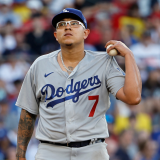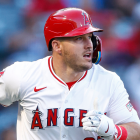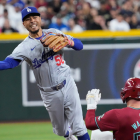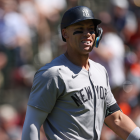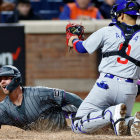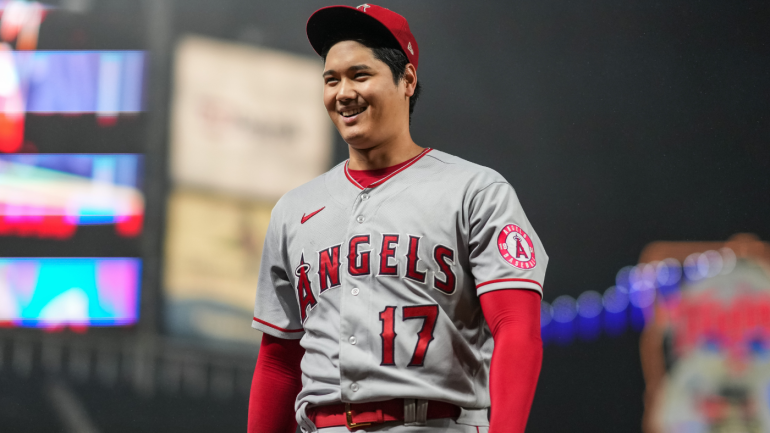
Los Angeles Angels general manager Perry Minasian toned down a winter of speculation on Monday before it could begin by announcing he would not trade two-way phenom Shohei Ohtani this offseason. Ohtani, who will be eligible for free agency this time next year, will at least begin the 2023 campaign as a member of the Angels roster, per Minasian.
Minasian's declaration may come as a surprise given that the Angels listened to inquiries about Ohtani at the trade deadline, and that they finished the season with a 73-89 record. Ohtani, for his part, has voiced his displeasure with how the Angels performed in 2022. Upon arriving in Japan last month, he said that August and September dragged on and that he has a "rather negative impression of this season."
Nevertheless, explaining why teams do things is part our business here at CBS Sports, so we decided to highlight four reasons why the Angels seem content to stand pat with Ohtani throughout the offseason, thereby taking the risk that they won't receive as good of compensation (either through trade or him leaving via free agency) as they could if they acted now.

CBS Sports HQ Newsletter
Your Ultimate Guide to Every Day in Sports
We bring sports news that matters to your inbox, to help you stay informed and get a winning edge.
Thanks for signing up!
Keep an eye on your inbox.
Sorry!
There was an error processing your subscription.
1. Moreno still owns the team
Back in July, we noted that other front offices believed the biggest hurdle to an Ohtani trade was owner Arte Moreno's unwillingness to sign off on a deal. Sure enough, Jon Heyman of the New York Post reported after the deadline that "Moreno told folks in his front office he simply could not trade Ohtani while Mike Trout and Anthony Rendon were out with injuries."
Moreno has since announced his intent to pursue a potential sale of the team, but it's unclear how much progress he's made on that front, or when a deal could be finalized. For the time being, Moreno may feel it's not his place to trade Ohtani with the future of the franchise hanging in the balance. Conversely, he may not want his final major act as owner to entail trading a generational player before he absolutely had to do it.
Moreno is the boss until he's not, so it stands to reason that he was part of the decision-making process. In that respect, it doesn't matter what justification he used.
2. One more ride with Trout
The Angels have been both blessed and cursed to employ Ohtani and Mike Trout, two historic Hall-of-Fame-caliber talents. Unfortunately for Ohtani and Trout, and the Angels fans, the front office has failed to build a consistent winner around them.
In fact, Ohtani has been a member of the Angels organization since the 2018 season and has not enjoyed better than an 80-win season. Trout, meanwhile, has appeared in three postseason games for his career, and none since the fall of 2014.
You would think that eventually, if only by luck, the Angels have to get it right in assembling a competent supporting cast around Ohtani and Trout. There's no way they strike out completely, right? That's to be seen, but you can understand if the Minasian and crew feel motivated to take one last swing while both are under their employment. And if they get it wrong, again? They can trade Ohtani at the deadline.
3. Ability to make easy upgrades
If the Angels are going to make a run in 2023, they're going to have to upgrade at several spots this offseason. Los Angeles ranked 23rd in Wins Above Replacement accrued by positional players, including in the bottom five at catcher (30th), first base (28th), third base (29th), and left field (28th). The Angels also ranked in the bottom 10 at shortstop (21st), meaning they were well below average at five positions.
It might be overstating things to write that there's an upside to being so bad, but we're going to do it anyway. The silver lining we have in mind is that it should be easy to find upgrades this offseason. The Angels could pluck a few league-average performers and, provided they produced to expectations, see massive gains.
Now, the last part -- the execution -- is key because the Angels have tried and tried again to sign middle-of-the-road free agents. It never seems to work for them, and they never seem to have the organizational depth required to replace the laggards, either through internal promotion or through external acquisitions. Minasian, to his credit, may have found a way to give the Angels some extra depth next season.
4. They're being aggressive with draft picks
We noted this at the deadline, but the Angels have been extremely aggressive under Minasian when it comes to pushing their draft picks up the ranks.
Minasian has been at the helm for two drafts to this point, selecting nine total players in the top five rounds. Of those nine players, eight have already played at the Double-A level. That includes shortstop Zach Neto, the 13th pick in the 2022 draft, as well as his other three selections from this July. (And it doesn't include Chase Silseth, an 11th-round pick in 2021 who has already made his big-league debut.)
In addition to Neto, who posted an .874 OPS in 30 Double-A games, the Angels have right-handers Sam Bachmann, Ben Joyce Landon Marceaux, Luke Murphy, and Brett Kerry, as well as lefty Ky Bush, and first baseman Sonny DiChiara positioned where they can be reasonably certain they'll make their big-league debuts in 2023.
How unusual is that approach? Let's put it this way. There were five collegiate hitters taken ahead of Neto in July, and only one of them has reached Double-A.
Minasian and the Angels are banking on these youngsters being able to contribute to the majors sooner than later. It goes against the industry norm, and it seems like a risky strategy overall. If the Angels' need-for-speed development plan fails, they'll have wasted significant draft capital in what amounts to an unforced error.
Perhaps Minasian views it this way: if his draftees don't start reaching the majors and producing in the near future, neither he nor Ohtani will be around when they do.











